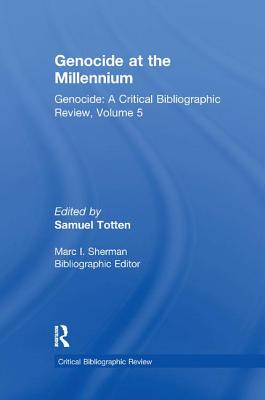

 Routledge
Routledge
Genocide at the Millennium


Key Metrics
- Samuel Totten
- Routledge
- Paperback
- 9781138510319
- -
- -
- Social Science > Violence in Society
- English
 Secure Transaction
Secure TransactionBook Description
Genocide at the Millennium is the fifth volume in the acclaimed series Genocide: A Critical Bibliographical Review. This latest volume's focus is both the genocidal activity that has taken place over the past fourteen years (including that in Rwanda and the former Yugoslavia) as well as a critique of the international community's response to genocide and potential genocidal situations (including those of the United Nations and nongovernmental organizations).
Genocide at the Millennium is divided into ten chapters. The opening chapter treats the Yugoslav genocide, discussing the causes of the conflict, the violence that ensued, the reaction of the international community, and the ramifications that are still being felt in that part of the world today. Chapter 2 provides a detailed and thought-provoking examination of the causes, results and ramifications of the 1994 Rwandan genocide. Chapter 3 examines the conflict in Kosovo and the events surrounding the controversial intervention by NATO. Chapter 4 discusses the remarkable efforts and successes that various non-governmental agencies have had in addressing a wide variety of issues related to genocide. Chapter 5 examines the United Nations' efforts to address the issue of genocide at the turn of the century. The role of individual states confronting issues and cases of genocide is analyzed in chapter 6. Chapter 7 gives a solid overview of the evolution of international law as it pertains to the crime of genocide and how and why major changes in such law have begun to take place in the 1990s and early 2000s. The international criminal tribunals for Rwanda and the former Yugoslavia are considered in chapters 8 and 9. The concluding chapter provides an extremely detailed and highly informative overview of key aspects of the International Criminal Court.
In keeping with the multidisciplinary approach of previous volumes in the series, each of the essays and accompanying annotated bibliographies have been written by experts in their fields, many of whom have worked for many years wrestling the thorny, and often horrific, issues germane to the issue of genocide.
Author Bio
Samuel Totten is Professor Emeritus at the University of Arkansas, Fayetteville. He is a longtime scholar of genocide studies. In 2004 he served as one of 24 investigators with the U.S. State Department-sponsored Atrocities Documentation Project, interviewing refugees from Darfur in refugee camps along the Chad/Darfur, Sudan border.
The data collected in the interviews were used by then U.S. Secretary of State Colin Powell to ascertain whether genocide had or had not been perpetrated in Darfur. On September 9, 2004, acknowledging the work of the ADP team, Powell informed the U.S. Senate Foreign Relations Committee that Sudan had perpetrated genocide in Darfur and was possibly still doing so. On his own over the next five years Totten continued to interview refugees from Darfur.
The results of that research is delineated in his book An Oral and Documentary History of the Darfur Genocide (Praeger Security International Press, 2011). From 2010 through today, Totten has focused on both the genocide by attrition perpetrated by the Government of Sudan against the people of the Nuba Mountains (late 1980s/1990s) and, more recently, the current war in the State of South Kordofan.
Thus far, two books have resulted from the latter research: Genocide by Attrition, Second Edition (Transaction Publishers, 2015), and Conflict in the Nuba Mountains: From Genocide by Attrition to the Contemporary Crisis in Sudan (Routledge, 2015). He holds a Doctor of Education degree from Columbia University in New York City.
Source: TheConversation.com
Videos






Community reviews
Write a ReviewNo Community reviews